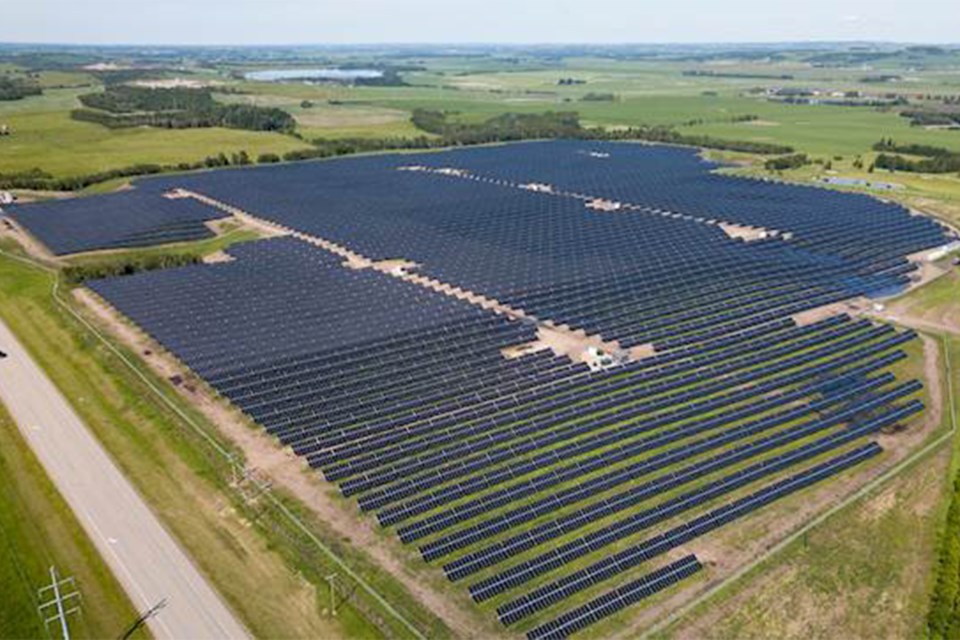The Alberta government recently announced it would be imposing a moratorium on all new renewable energy projects over one megawatt for at least six months – a moratorium that will not impact a recently approved solar farm project in Rocky View County (RVC).
By ministerial order, the province has ordered the Alberta Utilities’ Commission (AUC) to hold an inquiry to determine how these types of projects impact “pristine” (agricultural and environmentally sensitive) landscapes, to consider what types of mandatory security deposits should be charged toward eventual reclamation, the development of renewable energy projects on Crown lands, and the impact of these projects on the stability and reliability of the electrical generation supply in Alberta.
“We are proud of our leadership in responsible renewable energy development and we are committed to its continued growth,” said Minister of Affordability and Utilities, Nathan Neudorf, who issued the order in council imposing the moratorium, in a government news release. “This approach will provide future renewable investments with the certainty and clarity required for long-term development.”
Rural Municipalities of Alberta (RMA) president Paul McLauchlin released a statement to the media welcoming the moratorium and the inquiry. According to McLauchlin, rural municipalities across Alberta have been expressing concerns about the large footprint of solar and wind projects, and the inability of local governments to stop these projects when they feel they are inappropriate for a particular area – as local decisions are often overruled at the Alberta Utilities’ Commission.
“RMA is pleased by this decision to develop a province-wide plan for how the industry can grow strategically and responsibly,” he said in a statement released to the media. “Rural municipalities cover roughly 85 per cent of Alberta’s land and their voices must be included in the approval process for all renewable energy projects. We look forward to working with the Government of Alberta to create an approval process that balances provincial and local perspectives and positions Alberta as a leader in responsible renewable energy development.”
Rocky View County (RVC) joined McLauchlin and the RMA in welcoming news of the provincial moratorium.
“Rocky View County agrees that this is a prudent step to address these issues with respect to renewable energy development,” the County said in a statement released to local media. “Clear policies regarding the location of wind and solar projects, reclamation, and municipal governance roles will greatly assist with balancing the needs of residents and agricultural producers with sustainable, renewable energy projects. Rocky View County will participate in any engagement process from the province to assist with policy development for wind and solar projects.”
Rocky View Division 5 Coun. Greg Boehlke, who is chair of the County’s Agricultural Service Board, has led the charge on council in recent months to lobby the provincial government to undertake just such a review.
Boehlke attempted to gather support earlier this year among rural municipalities in the region to encourage the province to rethink its renewable energy project development policies. The RVC council veteran's concerns with these types of projects are that they often take agricultural lands out of production when approved by the AUC.
“It’s lucrative for the landowners, I understand that, and they get plenty of rent,” he acknowledged. “Although, I think, they are mainly responsible for (reclamation). But on one side of our face, we talk about food production (on farmland) and food shortages, and on the other side we talk about renewable energy.”
Boehlke said from Rocky View County’s perspective regulations and standards around solar and wind energy development in Alberta have been like the “Wild West” in recent years, and have caused several bitter public disputes about such projects at local council meetings. He referred to the recent AUC decision to override RVC’s rejection of General Land and Power’s Sollair Project just north of Airdrie as one recent example of such disputes.
“I think the government did the right thing to slow (the industry) down, have a look, and try to get some regulations around (development),” he stated.
However, in response to an email inquiry made by the Rocky View Weekly to the AUC about the Sollair Project, a commission spokesperson said the General Land and Power enterprise will not be affected by the recent moratorium, as the project has already received the green light. The moratorium would only apply to new project approvals.
“So, the already issued Sollair approval (in May) is not impacted by the government’s direction to pause new approvals (in August),” the AUC statement read.
The Rocky View Weekly also reached out to General Land and Power for a statement on the provincial government’s moratorium, but the company stated it did not have "any comments to make regarding these matters."
After the order in council was issued by the province, the Canadian Renewable Energy Association (CanREA) called the Alberta government’s decision a “mistake.”
“Alberta has benefited from market advantages that have allowed the industry to thrive here, which has benefited our communities, consumers and landowners; we must not lose this competitive advantage,” wrote Vittoria Bellissimo, CanREA’s president and CEO.
“The Alberta Government, Alberta Utilities Commission and Alberta Electric System Operator need to move quickly to sort out this situation for all Alberta ratepayers, investors and municipalities.”



